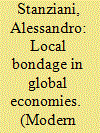| Srl | Item |
| 1 |
ID:
160664


|
|
|
|
|
| Summary/Abstract |
Wherever Indians have migrated, they have carried with them their culture, which has subsequently served to build multi-layered bridges with their country of origin. The article studies the Indian migration to the French territory of Reunion Islands located in the southwestern Indian Ocean and delves into various factors, including the historical, demographic, socio-economic aspects of the evolution of the Indian diaspora. The article attempts to present the mosaic of the Indian diaspora’s dynamic and its potential in the context of French policies and the ethno-religious issues superimposed over the current regional geopolitical environment.
|
|
|
|
|
|
|
|
|
|
|
|
|
|
|
|
| 2 |
ID:
121981


|
|
|
|
|
| Publication |
2013.
|
| Summary/Abstract |
This paper compares the definitions, practices, and legal constraints on labour in Britain, France, Mauritius, and Reunion Island in the eighteenth and nineteenth centuries. It argues that the way in which indentured labour was defined and practised in the colonies was linked to the definition and practice of wage labour in Europe and that their development was interconnected. The types of bondage that existed in the colonies were extreme forms of the notion, practices, and rules of labour in Europe. It would have been impossible to develop the indenture contract in the British and French empires if wage earners in Britain and France had not been servants. The conceptions and practices of labour in Europe and its main colonies influenced each other and were part of a global dynamic.
|
|
|
|
|
|
|
|
|
|
|
|
|
|
|
|
| 3 |
ID:
177149


|
|
|
|
|
| Summary/Abstract |
Reunion Island, similar to most insular regions, is ruled by a carbon-based economy that is heavily dependent on fossil fuels. In recent years, the energy transition towards a low-carbon economy has become the watchword of this French overseas region, with the objective of a 100% renewable energy mix by 2030. Reducing fossil fuel use while maintaining economic growth is an important issue for all countries but is even more important for island territories with structural and geographical handicaps. Energy transition and drastic greenhouse gas emission reductions represent costs and opportunities that need to be quantified. This research paper assesses the environmental and macroeconomic effects of the carbon price policy introduced in France to meet the target of the Paris Agreement. The acceptability of the tax significantly depends on the possibility of recycling tax revenues. Different schemes for recycling tax revenues are considered in simulations. The methodology used is a computable general equilibrium (CGE) model for Reunion Island (GetRun-NRJ) that takes into account all island specificities. The results show that the carbon tax enables substitutions between fossil and renewable energy production and reduces CO2 emissions. However, the tax has negative effects on the aggregate economy. The implemented tax revenue recycling compensation mechanisms mitigate the negative impacts, but the results differ significantly, as the recycling schemes do not support the same economic actors.
|
|
|
|
|
|
|
|
|
|
|
|
|
|
|
|